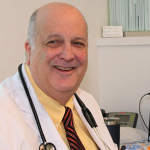
Dr. Wallace
Daniel Wallace, MD, FACP, MACR, a rheumatologist affiliated with Cedars-Sinai Medical Center, Beverly Hills, Calif., found a position at the intersection of private practice and academics during his fellowship at the University of California, Los Angeles (UCLA), where he conducted research and developed a close relationship with his mentor, Edmund Dubois, MD, FACP. At the time, Dr. Dubois had the largest cohort of lupus patients in the U.S. and was the principal editor of the only substantial textbook on lupus (Dubois’ Lupus Erythematosus and Related Syndromes, now in its ninth edition).3
Dr. Wallace assumed the practice of Dr. Dubois upon his passing in 1985, and since that time he has been the author of eight medical textbooks and nearly 450 peer reviewed manuscripts, and was named an ACR Master. He was recently the principal investigator for an NIH R01 grant and a Department of Defense grant, and was lead author of a clinical trial of baricitinib as treatment for lupus, published in The Lancet in 2018.4
Dr. Wallace notes that to be successful in balancing scholarly and clinical practice work one must be a bit obsessive-compulsive, with a clear schedule and plan that allows for completion of many tasks each day.
For graduating fellows, he notes that it is important to decide where in the country they want to live and to see what opportunities for academic and research work are available in those areas. Early on in one’s path, it is important to identify mentors and discuss where you want to be in 5–10 years in terms of career and lifestyle. It may also be very helpful to continue to be involved in teaching and working with trainees, something Dr. Wallace has done as associate director of the rheumatology fellowship program at Cedars-Sinai Medical Center. Indeed, Dr. Wallace notes that working with excellent colleagues and fellows allows for the sharing of responsibilities for patient care and provides an infrastructure for teamwork to help complete larger projects.
Pursuing scholarly work is not without its challenges, and Dr. Wallace explains that regulations, compliance issues and bureaucracy related to receiving grant funding and administering clinical trials can all be obstacles to success. He makes note of a particularly important and time-saving concept, futility analysis. During the course of a clinical trial, it is possible to assess if the treatment being tested is unlikely to beat the control intervention, thereby indicating that terminating the trial will save precious time and resources.

